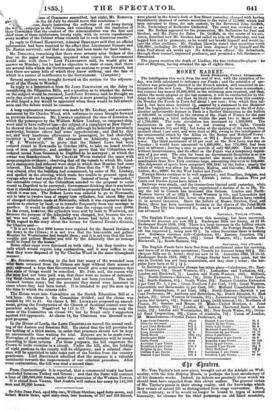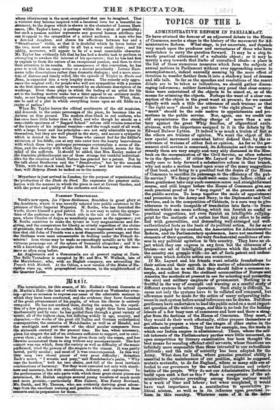ilit quirts.
Mr. Tom Taylor's last new piece, brought out at the Adelphi on Wed- nesday, with the title Helping Hands, is perhaps the least satisfactory of all his dramatic works. Indeed, its defects are precisely those which we should least have expected from this clever author. The general virtue of Mr. Taylor's pieces is their strong reality, and the knowledge which they evince of actual life as distinguished from stage convention. Here, on the contrary, as if he would no longer be bound to types of normal humanity, he chooses for his chief personage an old blind musician, whose idiosyncrasy is the most exceptional that can be imagined. That a violinist may become-inspired with a fanatical love for a beautiful ins strument, to the degree which is shown in the character of Lorenz Hart. -mann, (Mr. Taylor's hero,) is perhaps within the region of possibility.; but such a passion neither represents any general human attribute nor can it appeal to the sympathies of a mixed audience. A man who has a devoted daughter, and shares his affections between her and a "Stradivarius" violin, so that it is doubtful which be loves better of the two, must seem an oddity to all but a very small class ; and his oddity, moreover, will appear to be of a most unamiable character. Mr. Taylor has evidently felt that he has had a double task to perform in attempting to awaken the interest of his spectators; that he has had first Am explain to them the nature of an. exceptional passion, and then to rivet 'their attention to its resulte. In consequence of this conviction, he has gone to work like an essay-writer on a mental peculiarity - Lorenz Hart- mann talks dissertations rather than dramatic dialogue; and a mere anec- dote of distress and timely relief, like the episode of Triplet in Masks and Saves, is expanded into a very lengthy drama. The remedy only aggm- mates the original evil ; for people who• will not sympathize with a passion in the first instance can only be wearied by an elaborate description of its workings. Even those plays in which the feeling of an artist for his art is the leading motive make but a. faint appeal to an ordinary multi- tude, as not being sufficiently universal in their character. What, then, can be said of a plot in which everything turns upon an old fiddle axe centre of pathos ? When Mr. Taylor leaves the ethical sentiments of the old musician, and descends to the comic personages of the piece, be becomes like an Animus on firm ground. The modern shoe-black in red uniform, who has once been little better than a thief, and who though he stands. as a. respectable specimen of " Ragged School" reform still retainaaomewhat of the knavery of his original vocation—and the rough maid of all wm*, with a large heart and lay principles—are not only admirable types- in themselves, but they are well placed in the story, and secure a sympathy which is denied• to the -hero. Those who cannot feel for the fiddler's
• adoration of hie-fiddle, can at any rate enter into the hearty benevolenoe with whieh these two grotesque personages contemplate a scene of dia- trees, and the alacrity with which they use their humble means for the- relief of the sufferers. It should be added; that Mrs. Keeley makes of -_the feminine philanthropist one of those strange but truthful individual-
• ities for the creation of which Nature has granted her a patent. Not by the talk about Beethoven and the " Stradivarius," but by the uncouth 'Tilde, with her shock head, her " high-lows," and her not over-clean. see, will Helping Hands be tacked on to the memory.



































 Previous page
Previous page